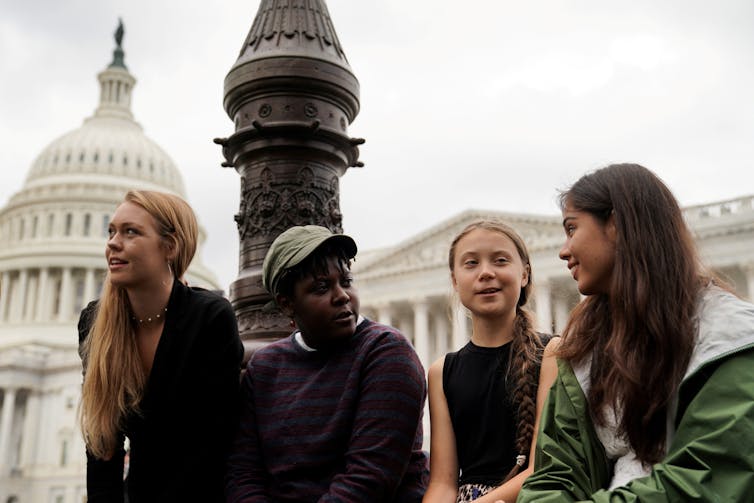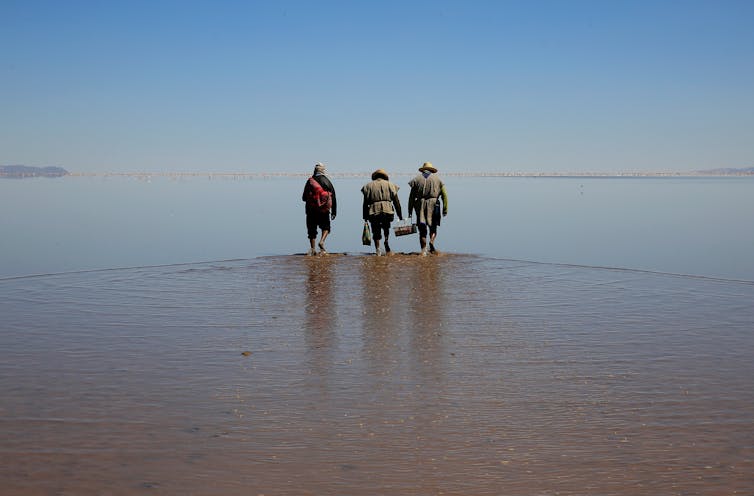Youth climate movement puts ethics at the center of the global debate
- Written by Marion Hourdequin, Professor of Philosophy, Colorado College
Even if you’ve never heard of Greta Thunberg, the 16-year-old Swedish environmentalist who crossed the Atlantic on a sailboat[1] to attend a Sept. 23 United Nations summit on the climate[2], you may have heard about the student-led Global Climate Strike she helped inspire, planned for Friday, Sept. 20.
People from more than 150 countries are expected to head to the streets to demand climate action. According to the organizers[3], the strike aims “to declare a climate emergency and show our politicians what action in line with climate science and justice means.”
The strike was galvanized by a global youth movement, whose Friday school walkouts[4] over the last year were themselves inspired by Thunberg’s own three-week strike in August 2018 to demand climate action by the Swedish parliament.
People of all ages will be joining this year’s protests at the United Nations, and adults – with their environmental organizations, climate negotiations and election campaigns – are gradually getting on board[5]. The Union of Concerned Scientists even published an “Adult’s Guide[6]” to the climate strike to help parents of participants get up to speed.
But the kids are clearly leading on climate change – and they’re changing the way we talk about this global challenge, putting ethics at the center of the debate.
Climate change is an ethical problem
Economic assessments of climate change, such as cost-benefit analysis, have for years helped justify political procrastination. By discounting[7] the importance of anticipated harms to people in the future, policymakers can argue that taking actions to address climate change today are too costly.
Short-term thinking by today’s “grown-ups” ignores her generation, Thunberg says[8].
“When you think about the future today, you don’t think beyond the year 2050,” she said in a 2018 TED talk[9]. “What we do or don’t do right now will affect my entire life and the lives of my children and grandchildren.”
 Thunberg, third from left, with fellow youth climate activists at the Capitol in Washington, D.C., Sept. 17, 2019.
Reuters/Sarah Silbiger[10]
Thunberg, third from left, with fellow youth climate activists at the Capitol in Washington, D.C., Sept. 17, 2019.
Reuters/Sarah Silbiger[10]
Youth climate activists argue that “our house is on fire[11]” and insist that world leaders act accordingly. They are attuned to the ecological consequences, intergenerational implications and international unfairness of climate change for all people living today.
Scholars in my field of environmental ethics have been writing about climate justice[12] for decades. The arguments vary, but a key conclusion is that the burdens of responding to climate change should be divided equitably – not borne primarily by the poor.
This notion of “common, but differentiated responsibilities” is a fundamental principle of equity outlined in the 1992 United Nations climate change treaty[13], which laid the groundwork for the many international climate negotiations that have occurred since.
Philosophers like Henry Shue[14] have laid out the reasons that wealthy countries like the United States are morally bound not just to significantly cut their own carbon emissions but also help other countries adapt to a changing climate[15]. That includes contributing financially to the development of climate-friendly energy sources that meet the pressing and near-term basic needs of developing countries.
Historically, wealthy countries[16] have contributed the most and benefited the most from fossil fuel emissions. These same countries have the greatest financial, technological and institutional capacity to shift away from fossil fuels.
Meanwhile, poor countries are often most vulnerable[17] to climate impacts like rising seas[18], more intense storms and eroding coastlines.
For these reasons, many environmental ethicists hold, wealthy high-emitting countries should lead the way on mitigation and finance international climate adaption. Some even argue that rich countries should compensate affected countries for the climate loss and damage[19].
Practical, not ethical
Political leaders tend to dodge questions of ethics in their policymaking and global debates on climate change.
According to Stephen Gardiner, a philosopher at University of Washington, climate policy often focuses on “practical” considerations[20] like efficiency or political feasibility.
U.S. climate negotiators in particular have for decades pushed back[21] against ethically grounded differentiated responsibilities and resisted top down mandatory emissions cuts, seeking a more politically palatable option: Voluntary emissions cuts[22] determined by each country.
And some legal scholars say a climate policy based not on ethics but on self-interest[23] might be more effective.
University of Chicago law professors Eric Posner and David Weisbach have gone so far as to suggest, on efficiency grounds, that developing nations should pay wealthy countries to emit less[24], since poorer and more vulnerable nations have more to lose as a result of the climate crisis.
 Poor countries have borne the brunt of global climate change. Here, indigenous Urus Muratos men walk on the dried-out Lake Poopo, once Bolivia’s second-largest water body.
Reuters/David Mercado[25]
Poor countries have borne the brunt of global climate change. Here, indigenous Urus Muratos men walk on the dried-out Lake Poopo, once Bolivia’s second-largest water body.
Reuters/David Mercado[25]
The kids aren’t buying it
Young activists like Greta Thunberg are reversing the marginalization of ethics from climate conversations.
With their focus on challenging “systematic power and inequity[26]” and respect and reciprocity[27], they recognize that virtually all decisions about how to respond to climate change are value judgments.
That includes inaction. The status quo – a fossil fuel-dominated energy economy – is making the rich richer and the poor poorer[28]. Sticking with business as usual, the argument goes, places more importance on near-term benefits enjoyed by some than on the longer-term consequences many will suffer.
Polls show the youth are concerned and engaged[29]. Youth activists are explicitly calling attention to the harm climate change is causing now and the harm it threatens for the future – and demanding action. And they are working internationally, in a global movement of solidarity.
Scholarship on climate ethics is robust, but it has had limited effects on actual policy[30]. Young people, on the other hand, are communicating the ethical issues clearly and loudly.
In doing so, they are demanding accountability from adults. They are asking us to consider what our resistance to change means for the world they will inherit.
Recently, my high school-aged daughter pulled a wrinkled climate strike flier out of her backpack, asking, “Can I skip school and go?”
I asked myself, “What am I saying if I say no?”
[ Like what you’ve read? Want more? Sign up for The Conversation’s daily newsletter[31]. ]
References
- ^ crossed the Atlantic on a sailboat (www.npr.org)
- ^ United Nations summit on the climate (www.un.org)
- ^ According to the organizers (globalclimatestrike.net)
- ^ Friday school walkouts (www.fridaysforfuture.org)
- ^ gradually getting on board (www.vox.com)
- ^ Adult’s Guide (blog.ucsusa.org)
- ^ discounting (digitalcommons.law.yale.edu)
- ^ says (www.npr.org)
- ^ 2018 TED talk (www.ted.com)
- ^ Reuters/Sarah Silbiger (pictures.reuters.com)
- ^ our house is on fire (www.theguardian.com)
- ^ writing about climate justice (as.nyu.edu)
- ^ United Nations climate change treaty (unfccc.int)
- ^ Henry Shue (www.merton.ox.ac.uk)
- ^ help other countries adapt to a changing climate (global.oup.com)
- ^ wealthy countries (www.researchgate.net)
- ^ most vulnerable (www.international.gc.ca)
- ^ rising seas (theconversation.com)
- ^ compensate affected countries for the climate loss and damage (www.tandfonline.com)
- ^ focuses on “practical” considerations (www.oxfordscholarship.com)
- ^ have for decades pushed back (www.oxfordscholarship.com)
- ^ Voluntary emissions cuts (unfccc.int)
- ^ self-interest (www.oxfordscholarship.com)
- ^ developing nations should pay wealthy countries to emit less (press.princeton.edu)
- ^ Reuters/David Mercado (pictures.reuters.com)
- ^ systematic power and inequity (www.teenvogue.com)
- ^ respect and reciprocity (www.teenvogue.com)
- ^ rich richer and the poor poorer (theconversation.com)
- ^ the youth are concerned and engaged (beta.washingtonpost.com)
- ^ limited effects on actual policy (ethicsandclimate.org)
- ^ Sign up for The Conversation’s daily newsletter (theconversation.com)
Authors: Marion Hourdequin, Professor of Philosophy, Colorado College

